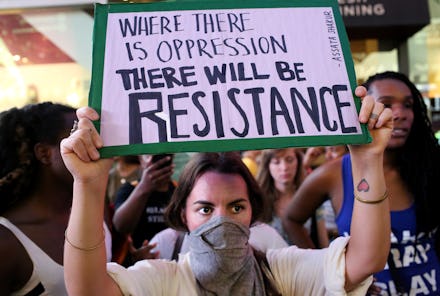Dear White People: It's Time for Us to Come Get Our Racist Relatives

On Thursday night, two civilians and 12 police officers were shot at a peaceful protest in Dallas, leaving five people dead. The rally was in response to the deaths of Alton Sterling and Philando Castile, who were killed by police in separate incidents earlier this week, and who are believed to be the 114th and 115th black men killed by law enforcement in 2016.
Sterling and Castile's deaths, though they occurred on opposite sides of the country — in Baton Rouge, Louisiana, and Falcon Heights, Minnesota, respectively — have reignited the #BlackLivesMatter movement, as well as a nationwide push for police reform and the end of white supremacy. They also serve as a stark reminder that it takes action to eradicate racist violence — and that it is not up to people of color alone to do the work of saving black lives.
Of course, asserting that black lives matter and demanding white people start to believe it has once again ticked off racists, who are quick to bring up "black-on-black crime" or say "all lives matter" in retort. This in itself is not surprising: So long as people in positions of power and privilege — ahem, white people — refuse to see or surrender their advantage, people will continue to be killed.
As has become clear from the continued violence against people of color, speaking out against bigotry isn't enough; and yet we have to speak out anyway. For a lot of white people (including myself), that means having heavy, uncomfortable conversations with some of the people closest to us: the racist family and friends who we love despite their ignorance.
Whether we are related to them, sleeping with them or cohabiting with them, it is up to us to call out bigots. That's particularly true when it comes to white family members who nonchalantly defend people like Ferguson Police Officer Darren Wilson before asking that we pass the baked ziti. A whole lot of white people — often the ones who changed our diapers or who carve the turkey on Thanksgiving — need help checking their privilege. So when your "crazy" uncle who thinks Trump really might not be so bad tries to tell you that all lives matter this weekend, try and discuss any or all of the following:
White people need to have conversations about the conversations we don't have.
Tackle the shooting in Dallas head-on. Talk about what happened. Mourn the officers who lost their lives, but also mourn the black deaths that led to the protest. Make it clear that those two things are not incompatible. Talk about Sterling and Castile first; say their names and make sure your friends and family members say them too. Make it clear that it's possible to support law enforcement and to mourn the deaths of officers who were doing their jobs, while also demanding that we start to treat black lives like they matter.
Talk about racist violence, even when there isn't a new tragedy making headlines. As Mic's Zak Cheney-Rice wrote on Thursday, confronting the possibility of violence — by the state or by other members of society — is something black families are forced to do constantly:
I remember very clearly when my brother taught me how to act around the police. Keep your hands visible at all times. Talk calmly and politely. Move slowly, and only after explaining in full detail what you are going to do before you do it.
Of course, white families don't issue warnings to their children about how to act around law enforcement officers — and that's exactly what we should be talking about. White people need to have conversations about the conversations we don't have — the ones that black families have been having for generations, about issues that don't even cross our minds.
Don't call someone a racist, but do talk about racism. Our history is objectively racist. This country was built on the pillaging of black labor, black bodies, black lives. There is no single portrait of racism; slavery and Jim Crow are far from the only examples we have. Institutional racism hasn't gone away, it's just taken different forms with each generation. Now, its most dominant public portrayal is a militarized police force, armed with guns and the knowledge they won't be held accountable for their actions.
That is essentially what makes it pointless to straight-up call a family member a racist; it shuts the conversation down immediately, because it prompts an outraged and self-defensive response. We have enough evidence that the world we live in is racist. We don't have to resort to insults and pejoratives to help people realize that.
Know when it's time to stop the conversation — then go do something else. Changing the minds of individual white people is key to dismantling white supremacy, but it's not the only work that needs to be done. There might be some minds that can't be changed — some racists who can't be enlightened, whether due to age, obstinacy or simple narrow-mindedness. So when it becomes clear that is the situation (and it is usually quite clear), end the conversation.
Once you shut it down, go to a protest. Say publicly and privately that black lives matter. Use the hashtags. Find out what your local police force's regulations are, and if you want them changed, do something. Figure out who your congressional representatives are, sit down and write them a letter. Vote to remove them from office if they don't listen. Tell them in as many ways as you can what you tried to tell your relatives, and what you should try to tell your relatives again: that we cannot continue to condone the taking of black lives.
Saying it once, to one person, won't feel like enough. It's not. But if we all confront our racist uncles, it will certainly be a start.
Read more: